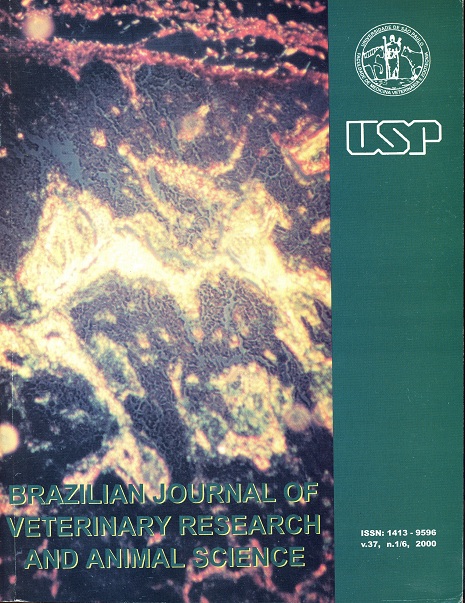Hematological, respiratory and cardiovascular response of equine submitted to three anesthetic protocols
DOI:
https://doi.org/10.1590/S1413-95962000000600013Keywords:
Anesthesia, Equine, Guaifenesin, KetamineAbstract
This research studied the hematological, respiratory and cardiocirculatory effects in thoroughbred equine subjects after the administration of 3 different induction protocols for general anesthesia. The animals were distributed in 3 groups. The animals from group 1 (G1) received acepromazine (0.1 mg/kg), guaiphenesin (113 mg/kg) and thiopental (2 g). The animals from group 2 (G2) received levomepromazin (0.2 mg/kg), midazolam (0.1 mg/kg) and ketamine (2.0 mg/kg). The animals from group 3 (G3) received detomidine (20 µg/kg) and tiletamine-zolazepam (1.1 mg/kg). The evaluation included clinical examination, venous blood samples for hematological analysis, arterial blood samples for gasometric analysis and eletrocardiographic records. Clinical parameters were observed, samples were taken and the ECG was recorded before any drug administration and 15 minutes after the last medication. The 3 protocols showed to be adequate when used before general anesthesia. Respiratory parameters showed no differences among the 3 groups. The cardiocirculatory events were transient and without clinical significance. The differences among the groups were related to the preparation of solutions (G1), frequency in drug supplementation (G2) and handling the animals (G3).Downloads
Download data is not yet available.
Downloads
Published
2000-12-01
Issue
Section
VETERINARY MEDICINE
License
The journal content is authorized under the Creative Commons BY-NC-SA license (summary of the license: https://
How to Cite
1.
Mello JRB de, Castro Junior JF de, Silva Filho A da PF da. Hematological, respiratory and cardiovascular response of equine submitted to three anesthetic protocols. Braz. J. Vet. Res. Anim. Sci. [Internet]. 2000 Dec. 1 [cited 2024 Dec. 26];37(6):491-6. Available from: https://revistas.usp.br/bjvras/article/view/5868





